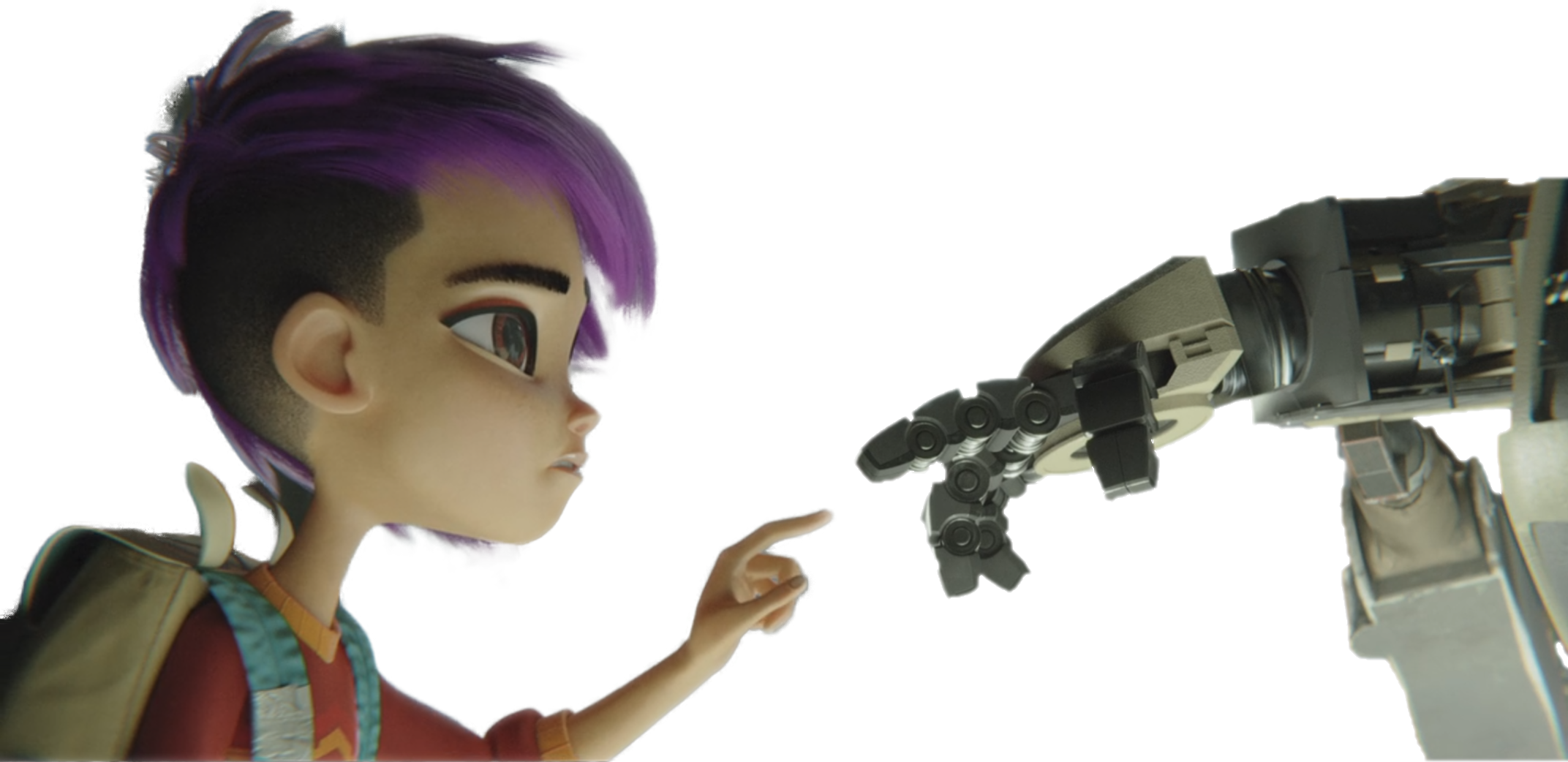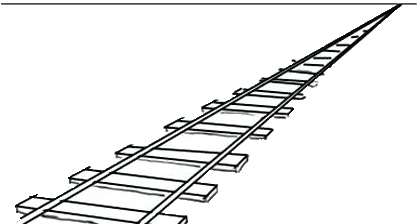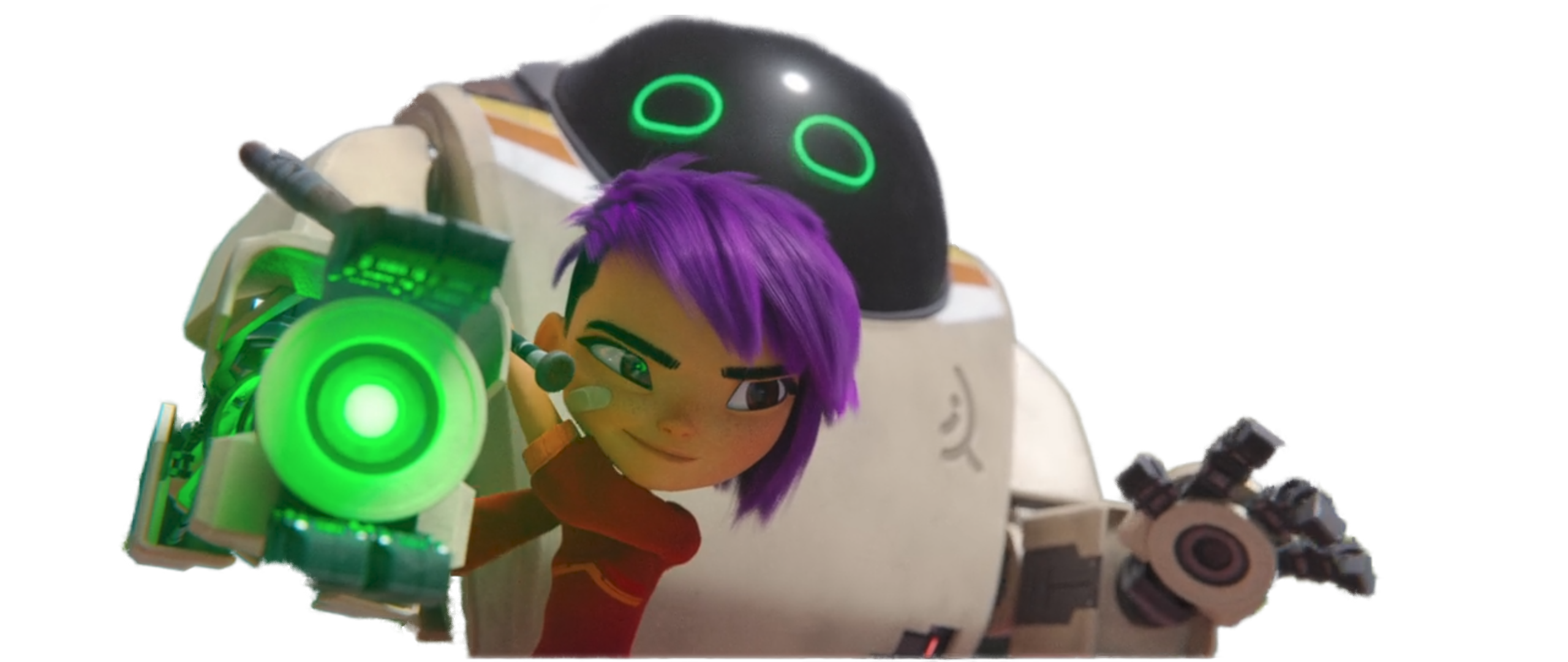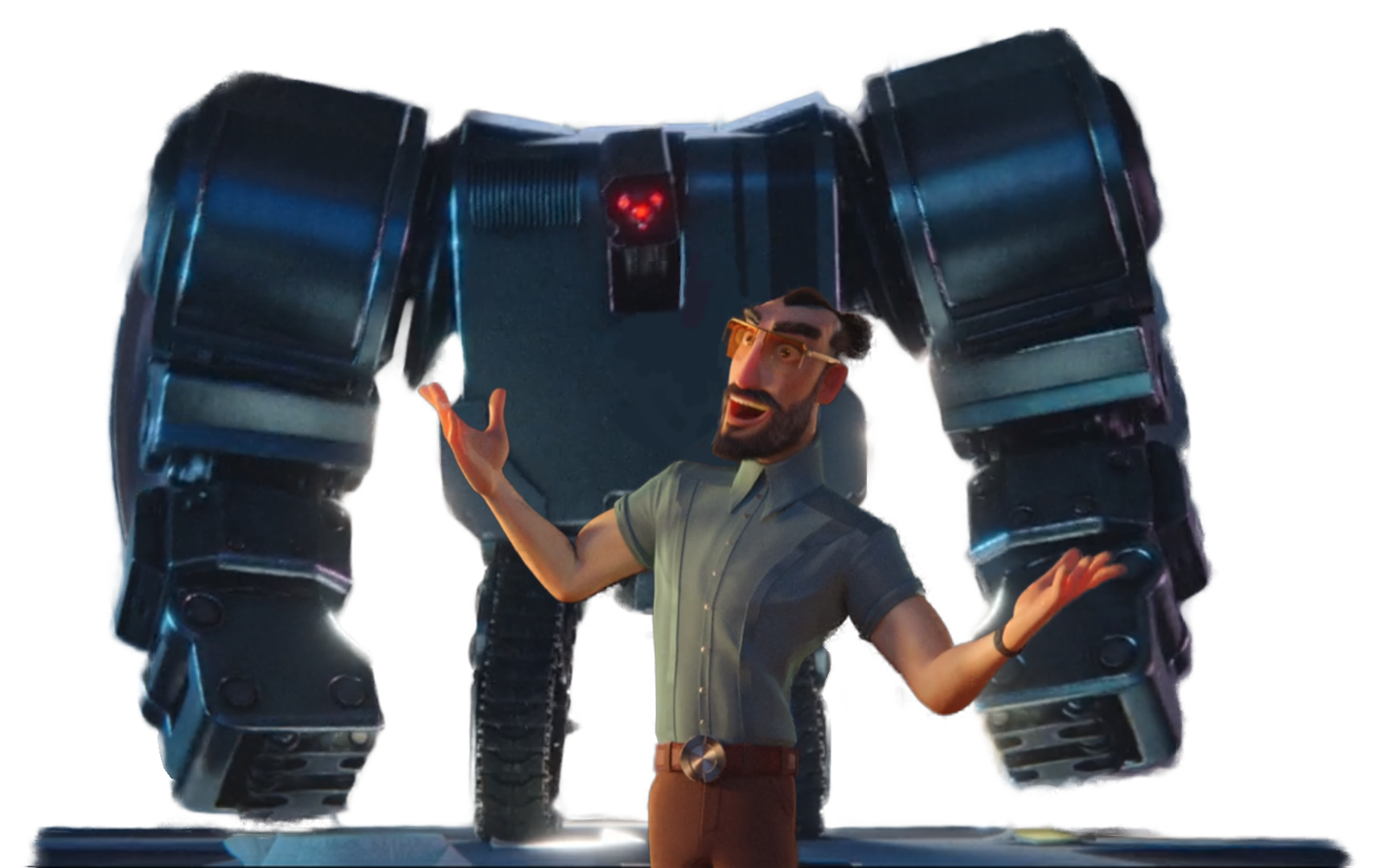Next Gen: Impressions & Insights
September 17, 2018
 September is here, bringing with it a fresh new batch of movies and TV shows for me to stare at for far too many hours at a time.
September is here, bringing with it a fresh new batch of movies and TV shows for me to stare at for far too many hours at a time.
This month’s topic is a recently released Netflix Original movie called Next Gen.
 It’s about a young girl named Mai, who stumbles upon a top secret robot known as 7723 inside the lab of IQ Robotic, a parody company of Apple.
It’s about a young girl named Mai, who stumbles upon a top secret robot known as 7723 inside the lab of IQ Robotic, a parody company of Apple.
The secret robot turns on in front of Mai and interacts with her for 3/4 of a minute, Mai delivers a few snide remarks to him within that window, then loses her backpack after being abruptly taken out by a security bot. 7723 picks up her backpack, feels the urge to return it to her, and boom! We’re underway.
I’ve taken the time to mine it up and grind it down for your viewing pleasure. Now, let’s toss this thing in the blast furnace and see what its made.
Pacing:
 Ahem! Your attention please! Due to unforeseen circumstances, the Plot Line is experiencing delays. It will arrive 25 minutes behind schedule. Thank you.
Ahem! Your attention please! Due to unforeseen circumstances, the Plot Line is experiencing delays. It will arrive 25 minutes behind schedule. Thank you.
I’m serious. I could tell you to skip ahead in this movie, from the first interaction between Mai and 7723 and the second. 25 whole minutes of screen time in a 95 minute movie. How much is lost? The answer isn’t nothing, but it’s still far too little. You wouldn’t be terribly lost or confused, which is universally a bad sign. That’s what happens when you want to start right in the middle of the action without a creative method for delivering exposition. If Mai and 7723 didn’t meet 10 minutes into the movie, we’d have more time with Mai front and center, so we could relate to her. What if, instead of going straight into Robotics IQ, the first scene led to East Lake Academy, where we can have the skate-soccer field debacle with Ani and Greenwood play out the exact same way: Ani, introduces herself after getting hit with the ball, Greenwood barges in and kicks them off the field, fight ensues, etc.
Now, in this hypothetical version, we know Mai a lot better, and when she goes into Robotics IQ, she is already the main focus of the story. Between her, the CEO character, Justin Pin, and the programmer, Dr. Tanner Rice, and 7723, this plot is not only slow, but it’s too busy. There’s too many moving parts without a firm hold on one person in particular. Mai is clearly the desired focal point, so shedding a lot of the excess scenes with Pin and Rice could really lighten the load.
Additionally, the snail’s pace 7723 travels at to return Mai’s backpack is hardly helping. A highway chase scene? Really? You couldn’t find a more efficient and entertaining way to get 7723 to Mai? Pin can learn about 7723 a million different, better ways than for him to go plowing through the streets like a wrecking ball. That charade alone costed the audience three minutes and probably half of its engagement.
His core memory being destroyed from a fall is a tall order for me to suspend my disbelief. For a robot to damage one piece of hardware in a blunt-forced fall is absurd, especially when the entire depiction of this robot from here on out is rooted in his ability to deliver and sustain blows. When the plot doesn’t demand it, his hard case is sturdier than carbon fiber. He could literally just not have enough storage memory built in, being a prototype and all, or his memory core could be detached from the beginning, Both of these options are quicker and fit better for the viewer, while allowing the storage space subplot to stay around, because, honestly, I actually really dig that subplot. 7723 having to delete certain memories of Mai in the first act to keep his storage from filling is poignant and perfectly blends into Mai’s internal conflict.
Mai’s Journey:
Right around the mid stages of this story is where the movie hits some solid beats. As a character, Mai is incredibly well-developed. She lives in a broken, fatherless home, her mother barely pays her any mind because she’s addicted to her Q-Bot, and she’s got no friends and a ton of attitude. The hate that Mai has for robots is substantiated by her situation. Furthermore, it’s a nice little touch that she takes advantage of 7723 when she learns of his utilities. She gets payback on Greenwood and her gang, kicking them off the field, and then she starts aiming higher. She blows up a bunch of robots, around the house and in the city, and starts vandalizing stuff, building up to a final encounter with Greenwood.

This is unilaterally my favorite scene in the movie. The exact moment that 7723 winds up on her doorstep, Mai is completely self-absorbed and sees an opportunity to get revenge. It’s a neat touch that we, the audience, are left in the dark about her intentions, since, on-screen so far, it appears like she’s only seeking protection from bullies.
In this exchange, not only does the extent of Mai’s anger surface, but we see her desires. She wants domination—she wants to hurt people who have hurt her. Not something you hear often for protagonists nowadays, is it? It’s not for lack of consideration; most writers squirm at the thought of toeing that line. They’re deathly afraid that their audience will despise malevolent characters and find defects of that severity unredeemable. In actuality, we love that shit. It speaks to a repressed desire hardwired into our brain. Our emotional response to being hurt is to hurt. When it makes sense to do so, when it doesn’t—doesn’t matter. That’s how we feel. Sometimes we control it or it controls us.
Saintly characters who never act out in anger, fear, or pride are like a bowl of broccoli: wholesome and nutritious, but boring and unappetizing. Mai, in contrast, is a chocolate fudge sundae with caramel, crushed Oreos, and M&M’s. She’s a hot mess, but we love her more for it.
(Weak) Depth:
Without question, Mai is the best aspect of Next Gen, which makes me wish that the script stuck around her world. Soon enough, Dr. Rice finds 7723 and drops into Mai’s house and this is where everything turns south. He starts frantically inspecting the robot, and offers a chip that acts as a factory reset button for 7723, which will fix his memory storage problems, but he’ll have to have his current memories wiped. Oh, dilemmas, dilemmas. Wait a second! Can’t 7723 just transfer his memories to a futuristic flash drive before he wipes his system? Hmm, that’s an interesting poi—Oh, look! Justin Pin’s here!

And he’s come to fuck everybody’s day up! Ares, the giant killer robot in the back who’s been Justin Pin’s shadow for literally the entire length of the movie turns out to be a super weapon! They’re making Q-Bots to destroy all of humanity! What a twist!
Why does this fall flat on its face? Key word: depth, or more accurately, the lack thereof. Mai is a great character, and the world building is at least halfway decent. But Dr. Rice, Justin Pin, Ares, Robotics IQ? Flat as a wakeboard.
This leaping off point into the third act, should’ve been a wake-up call on the first go-around in writing this script. Justin Pin, Bluetooth synced with Ares or not, makes no God damn sense. His goal to destroy mankind is so simple, and yet his means to reach it is so convoluted, oblique, and outlandish that it’s essence could be repurposed for a government-grade encryption software. Why are we on Gen 6 of Q-Bots if they’re made to be literal landmines to detonate on their owners? What was the whole point of Dr. Rice whatsoever? He knows Justin Pin is really Ares, so why is he making the coding for the Q-Bots? Couldn’t he just refuse to make it, instead of building an anti-Q-Bot warrior in 7723? If he’s been threatened into this position, shouldn’t he quite easily be able to program a kill switch to thwart Pin’s plans when it matters?
I mean the movie just blazes right past all these contradictions and devolves into a fight that nobody wins or loses, barring Mai’s mother, who gets kidnapped by Pin in the aftermath. Instead of trying to fill us in on what Pin was plotting during the sloppy, directionless scenes in Act 1 and 2, you should have been trying to fill us in on how Pin was plotting. Imagine if this happens out of the blue for the audience as well. There’s some suggestive scenes, but nothing on the nose like what ultimately came out in the movie. Instead, we follow Pin through some managerial clues. Some things that are a bit odd and disconnected at first, but this is the catalyst that clicks them all together. This scene, instead of being a shitfest, turns into both an epiphany and a genuine plot twist.
Of course, it’s not a cure-all. There’s still some massive gaps and far-reaching concepts in this dumpster fire, but an unintelligible plot with a crafty delivery can work a lot better than people think. It certainly wouldn’t hurt the transition into the climax.
Scope:
After escaping Pin, Mai and 7723 argue a bit in the sewers since he had disabled his weapons for additional storage, but they make up soon enough, stronger again, and turn their sights to saving Mai’s mom. No plan or anything, they kinda just storm the castle and find Dr. Rice. Justin Pin with his robotic sixth sense barges in again to duke it out for Round 2.
Oh, and here Dr. Rice kinda just dies here for no reason. Cool, I guess. For being the inventor of 7723 and the Q-Bots, his lackluster contribution in the plot line is infuriating. He honestly would’ve been better served just being Pin’s evil lackey at this rate, which is sad. I wanted Rice to have some force on Mai and 7223 as the plot went on. Instead, we get dropped into a skate-soccer field and pandemonium takes over.
This story is horrendously out of scope. The fighting starts down at playground middle school drama range and ends on a stage grand enough to make Dragon Ball Z salivate with jealousy. Ares kicks the declawed 7723’s ass until he finally chomps on the forbidden fruit and wipes his system. While his memories delete over five full minutes, his weapons, conveniently enough, come back online instantaneously. Over the multi-level dual, Justin Pin’s plan to kill all humans switches to kill one, singular human girl (Mai), which switches again to kill only a robot (7723). Maybe he would succeed if he didn’t change targets so sporadically and without explanation, but alas, the billionaire robot is bested by the twelve-year-old girl.
Adaptability & Originality:
Image matters a great deal in garnering intrigue, and my first time watching it the first half I kept thinking, Gosh this is like Wall-E. Then the second half came along, and my mind switched over to Big Hero 6. This is a huge uphill battle that the story needs to fight, but it just doesn’t succeed. My greatest question going into this movie was how will it differentiate itself from its predecessors in the genre. I’ve not gotten a good answer, but I could supply my own:
By sticking to the ground with Mai from Act 1 to Act 3.
Sci-Fi and Fantasy are plagued by trying to achieve the largest scale of conflict possible. But for tales such as this, the reach of its landscape is best kept small. Stakes are what make a story gripping, not the scale of the conflict (looking at you, Marvel), but this movie conflates the two as one and, in trying to elevate the plot, buries it. Keep it down to the ground. An epic saga requires an epic foundation, or else it falls apart. Think about that the next time a fictional world is once again plunged into peril.
❤️ Kristal liked you! Click Here: http://bit.do/fSRzN ❤️
❤️ Jade want to meet you! Click Here: http://inx.lv/p0Df ❤️
❤️ Faith want to meet you! Click Here: http://inx.lv/p0Df ❤️
a Maria – Dance, Maria [Official Music Video]! Click Here: https://youtu.be/E5DYlF6_x2U